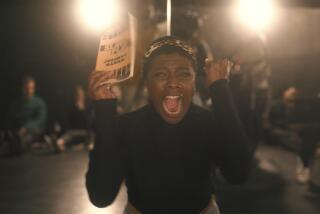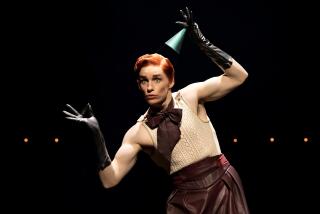MOVIE REVIEW : ‘Palace’ Menu Has a Prime Sarandon
In the searingly well-acted “White Palace” (throughout San Diego County), ad man Max Baron (James Spader), very drunk and not a little sorry for himself, seeks out a blue-collar bar on his way home from a St. Louis bachelor party.
It’s already been a bum night. He’s had a sudden, tangible reminder of his young wife, Janey, dead for barely two years. He has had a stinging exchange with a waitress at White Palace, a fast-food joint that shortchanged him on the bulk order of burgers he was to bring to the party.
At the bar, that same waitress, Nora Baker (Susan Sarandon), her surliness softened by the amount she has had to drink, picks him up with an offer to bury the hatchet. It’s astonishing the gradations of distaste that Spader can convey in less than a minute, from aversion to repulsion to polite contempt, but she won’t be stopped.
Her string of personal questions finally makes him blurt out that his wife hasn’t left him, she died . While this registers, Max waits for Nora’s mortified apology. Instead, after a long moment, she laughs, an earthy, utterly uninhibited laugh at the sheer craziness of life--his, her own, everyone’s.
It’s as shocking to Max, who is fishing for sympathy, as it is to the audience and a signal that this movie about the capricious nature of sexual attraction is going to be nicely unpredictable--at least until its last reel. It’s also a grand introduction to Nora, one of life’s straight-shooters, and probably Sarandon’s most complex, blazingly vibrant performance, topping even the magnum women of “Bull Durham” and “Atlantic City.”
Nora is the living equivalent of that towering, earth-planted, melon-breasted bronze by Gaston Lachaise, who surveys her gaping onlookers with such absolute assurance. Mercifully, director Luis Mandoki doesn’t want Sarandon to play a life force; he wants a raunchy, fallible, wounded real person--different enough from anyone Max has ever encountered to snap his head clear around. Sarandon obliges with gusto.
For Max, their first lovemaking is primal, full of smells and sounds and sensations unlike any in his 27 years. She likes it just fine too. Director Mandoki, who was equally lucid about the sexuality of his cerebral-palsied heroine in “Gaby--a True Story,” stages this cataclysmic encounter with a touching coda the next morning: Nora, muzzily half-asleep on the sofa bed, certainly real and also exquisitely beautiful in cinematographer Lajos Koltai’s painterly lenses.
So much for the easy stuff. Attraction is simple; it’s life that’s hard. Never expecting to see her again, Max is drawn back and gradually out of his little-old-man shell. She tells him forthrightly she’s 43; he tells her he’s a total wreck without her--and a different kind of total wreck with her. But what to do about the man who loves Mozart and the woman whose heart is with the Oak Ridge Boys? With the self-proclaimed “Hoosier” in her greasy apron and the fastidious yuppie?
Is there a chance for such mismatches, once they come up for air? More so in the complex book than in the movie. In restricting this relationship as much as they have, screenwriter Ted Tally and Alvin Sargent give them less of a chance than Glenn Savan’s original novel did.
The screenwriters are good at the boredom that inevitably surfaces, even with couples this physically enthralled. They are deft at sketching Max’s crowd, all Jewish, all aggressively yuppified--some might call them stereotyped. They are clear about the embarrassment Max feels about bringing Nora into this crowd, with her tacky clothes and forthright, unpredictable mouth.
So, why doesn’t he do something about bridging the gap? Unsurprisingly, she’s furious when he brings her household gadgets, and she’s proud; is there some rule that he couldn’t get her a sweater, a decent coat? Could he try “Opera Goes to the Movies” to introduce her to the music he loves? It’s kitschy enough to hook any romantic.
With Sarandon as Nora, audiences want more from Max, more of an effort, more steel, less moral puppy fat. She’s enough to make one see that youth, by itself, or even youth and money, isn’t quite all there is.
The novel, making clear his background, his relationship with his working-class mother (Renee Taylor), made Max exist in far less of a vacuum and gave us a greater sense of his capacity to become something quite beyond the rest of his friends. His mother’s friendship with Nora was a nice note, too--quite gone in the movie.
Max’s clear sign of change comes at the end of a touching scene with Eileen Brennan, marvelous as Nora’s estranged older sister, a woman with genuine mystical gifts. Touched by the insight he’s been given into Nora’s past, Max warms up almost tangibly, for the first time loving her, frailties and all. Although peculiar casting, Spader is fine throughout and terribly moving in this scene. It’s not exactly the rainbow bridge to the movie’s hyper-romantic ending, with its overtones of “An Officer and a Gentleman,” but it’s a start.
“White Palace” (rated R for its uninhibited love scenes and Nora’s coarse language) is more than a start for director Mandoki, who was sturdily launched with “Gaby”; it’s a continued indication of a sure and powerful sensitivity. Producers Mark Rosenberg, Amy Robinson and Griffin Dunne, with executive producer Sydney Pollack, have seen to it that the film has a flawless mounting: Koltai’s lush cinematography; Jeannine C. Oppewall’s production designs, perfect at both the high and low ends of St. Louis; Lisa Jensen’s witty, unexaggerated costumes and Carol Littleton’s succinct editing. Among this excellent cast, fans of “Gaby” will be pleased to see its star, Rachel Levin, here as the bubbly bride and tireless matchmaker also named Rachel.
‘WHITE PALACE’
A Universal Pictures release of a Mirage/Double Play production. Producers Mark Rosenberg, Amy Robinson, Griffin Dunne. Executive producer Sydney Pollack. Director Luis Mandoki. Co-producer Bill Finnegan. Screenplay Ted Tally, Alvin Sargent, based on the novel by Glenn Savan. Camera Lajos Koltai. Editor Carol Littleton. Production design Jeannine C. Oppewall. Art direction John Wright Stevens, set decorator Lisa Fisher. With Susan Sarandon, James Spader, Jason Alexander, Eileen Brennan, Kathy Bates, Steven Hill, Rachel Levin, Renee Taylor, Barbara Howard.
Running time: 1 hour, 44 minutes.
MPAA-rated: R (uninhibited sexual activity, brief nudity and strong profanity).
More to Read
Only good movies
Get the Indie Focus newsletter, Mark Olsen's weekly guide to the world of cinema.
You may occasionally receive promotional content from the Los Angeles Times.










